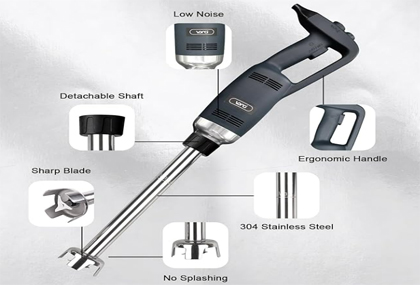How to Choose a Kitchen Mixer? Do You Know These Key Points?
Nov 13,2024
549
In the modern kitchen, a mixer has become an indispensable tool for many cooking enthusiasts. It can make the process of mixing ingredients much easier and more efficient. But with so many different types and models of kitchen mixers on the market, how do you choose the right one? Here are some important points to consider.

1. Power and Speed
The power of the mixer is a crucial factor. A more powerful mixer can handle tougher mixing tasks, such as kneading dough. Usually, a mixer with a power of 300 - 500 watts is sufficient for most home cooking needs. However, if you often make bread or other dough - heavy recipes, you may want to consider a model with higher power.
Speed settings are also important. A good mixer should have multiple speed options. Different recipes require different mixing speeds. For example, when you start to mix the dry ingredients, a low speed is suitable. When it comes to whipping cream or egg whites, a higher speed is needed to achieve the desired texture. Look for a mixer with at least 3 - 5 different speed settings.
2. Capacity
Think about the quantity of food you usually prepare. If you often cook for a large family or for parties, you'll need a mixer with a larger capacity. The capacity of the mixing bowl usually ranges from 3 - 7 liters. A smaller bowl, around 3 - 4 liters, is fine for single - person or small - family use. But if you plan to make big batches of cakes or large amounts of dough, a 5 - 7 - liter bowl will be more practical.
3. Attachments
The variety of attachments can greatly expand the functionality of your mixer. Standard attachments usually include a whisk for whipping, a dough hook for kneading, and a flat beater for general mixing. Some high - end mixers may also come with additional attachments like a pasta maker or a meat grinder. Consider your cooking habits. If you love making pasta from scratch, a mixer with a pasta - making attachment can be a great investment.
4. Build Quality and Design
The build quality of the mixer determines its durability. Look for a mixer made from high - quality materials. The body should be sturdy and the motor well - protected. The design also matters. A mixer with an ergonomic design will be more comfortable to use. For example, the handle should be easy to grip, and the controls should be conveniently located.
5. Noise Level
Nobody wants a noisy mixer that disrupts the cooking environment. When choosing a mixer, check the product reviews or specifications for information on its noise level. Some mixers are designed with noise - reduction technology, which can make your cooking experience more pleasant.
6. Price
Set a budget before you start shopping. Mixers can range in price from relatively inexpensive basic models to high - end, professional - grade ones. Decide what features are essential for you and look for a mixer that offers the best value within your budget.
Long - tail Keywords and Descriptions





